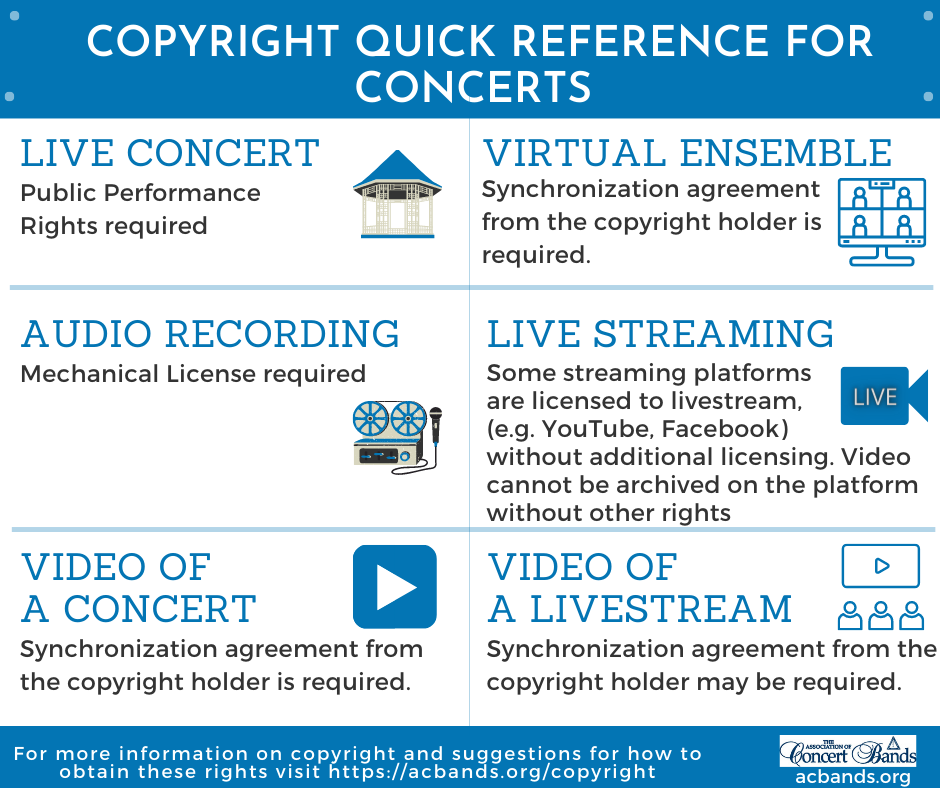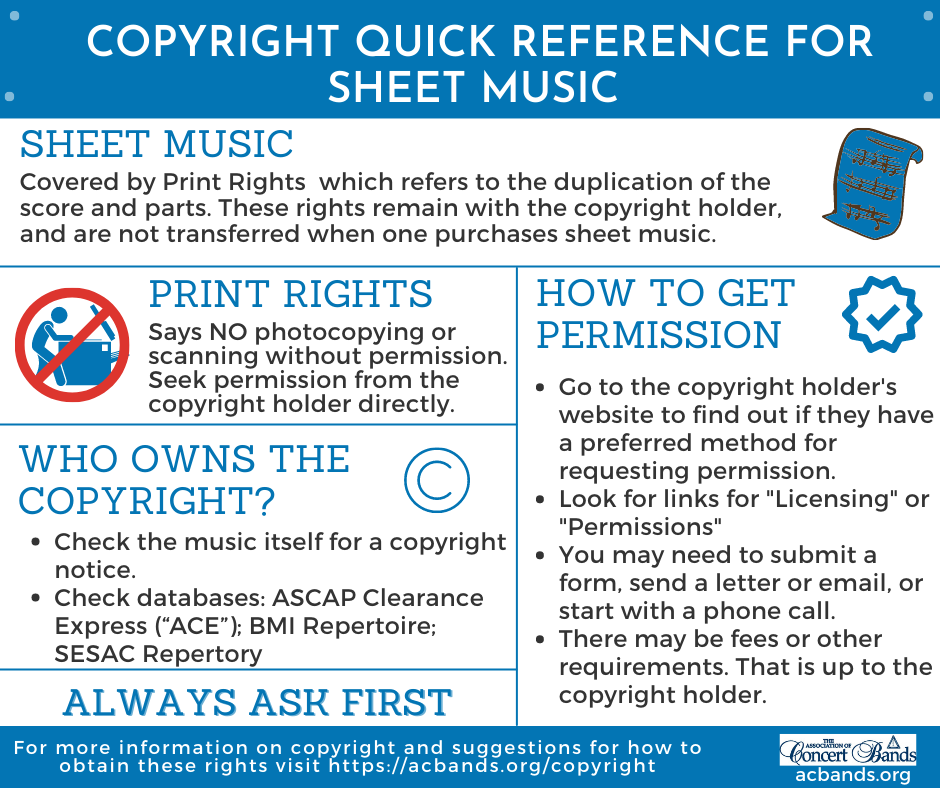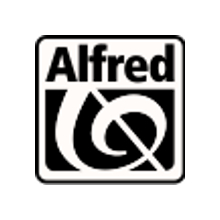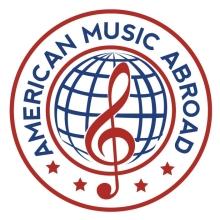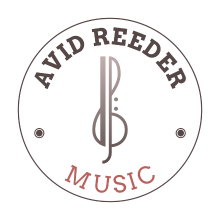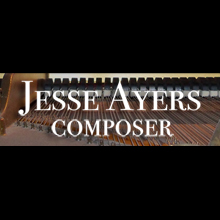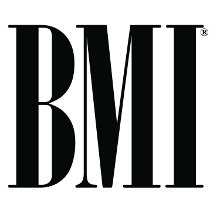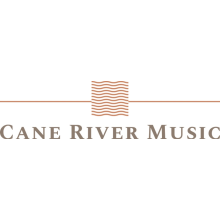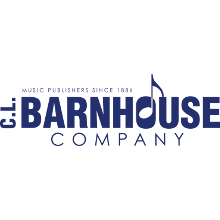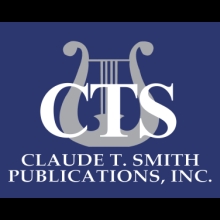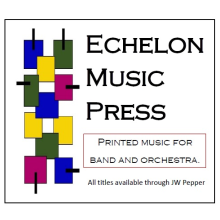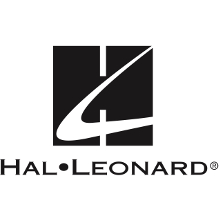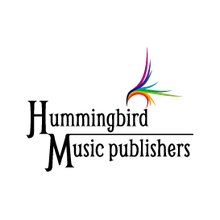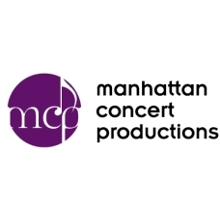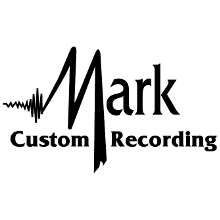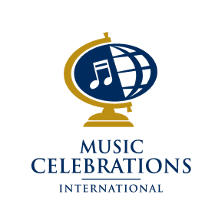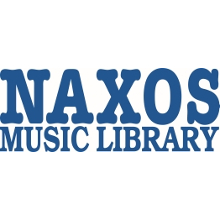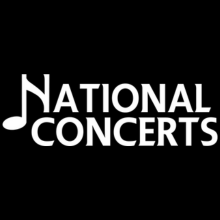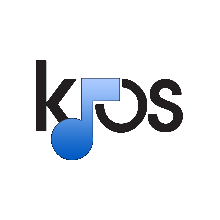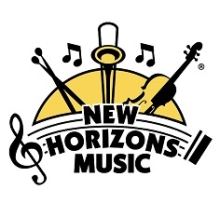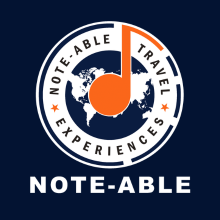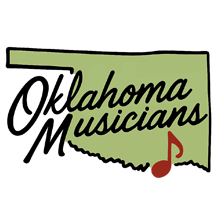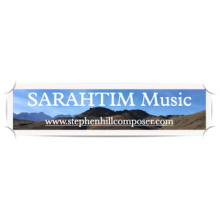- Home
- About
- Membership
- How to Join or Renew
- Membership Categories
- What's Included in ACB Membership
- Membership Coordinators
- Purchase ACB Gear (Lands End Shop)
- Resources
- Projects & Awards
- Events
- Contact
- Donate
GENERAL COPYRIGHT INFORMATIONMusic and music performance is protected by various forms of copyright protections. Each of these must be taken into account. WHO OWNS THE COPYRIGHT?To acquire the necessary rights, in some cases you need to go directly to the copyright owner. If you do not know who that is and cannot determine from the music itself, check the databases at ASCAP and BMI.
SUMMARY OF BASIC TYPES OF COPYRIGHT RELATED TO CONCERT BANDSNote: There are other forms of copyright that may be applicable if you are doing non-standard concert performances (e.g. Grand Rights for theatrical performance.)
Public Performing Right - Refers to the performance of the work in public. The copyright owner has the exclusive right to authorize the performance of the work in public. This authorization is acquired through a Public Performance License such as the ACB Blanket Performance License that can be purchased by ACB Member organizations. Please see our page on the Blanket Performance License for more details.
Print Rights - Refers to the duplication of the score and parts. These rights remain with the copyright holder, and are not transferred when one purchases sheet music. That means one may not make photocopies or scans of music even if the music was purchased. This also means that one is not allowed to sell or distribute the music in print or digital form which includes posting a copy of the sheet music online for download. One is only allowed to sell and distribute the original. This authorization to print, copy, or digitize is acquired through the copyright holder directly. For more information see our page with more information on print rights.
Reproduction Right - Refers to the reproduction and recording of the musical work including, but not limited to records, CDs, cassettes, and digital downloads. This authorization is obtained through a Mechanical License that can be obtained from a variety of places. Two examples of entities that handle mechanical rights are Harry Fox Agency, Inc. and Easy Song Licensing.
Synchronization License - Refers to synchronization of the musical composition in timed relation with audio-visual images (video). This includes a post-recording of a livestream, and a virtual ensemble. This authorization is acquired through the copyright holder directly.
Internet Streaming - Refers to broadcasting live across an internet platform*. ASCAP and BMI currently have agreements with YouTube, Facebook, and Instagram Live that do not require a separate license by the performer for the livestream. For other platforms you will need to contact them to see if there are existing agreements or if you will need a separate license. See “More resources on Internet Streaming” below for more detailed information. If you wish to stream on your own website, you will need a digital license for your website. See the following pages for ASCAP (https://licensing.ascap.com/?type=digital) and for BMI (https://www.bmi.com/digital_licensing?q=Web+Site) for more information on a digital license for your website. *a recording of a livestream made available after the event requires a synchronization license. YouTube and Facebook defaults are often set to make the recording of the livestream available following the livestream - however you still need to ask the copyright owner about a synchronization license. For some "do's and don't" of virtual concerts and events see the webinar (and associated blog post) from JW Pepper linked below. More resources on Internet Streaming
Permission to arrange - Refers to arranging or adapting someone else's work. The only work exempt from needing permission is that which is in the public domain. Permission to arrange or adapt must be obtained from the copyright owner or print representative before you start working on the arrangement - not after. COMMON PUBLISHERS WITH LINK TO INFORMATION FOR OBTAINING PERMISSIONS
OTHER COPYRIGHT RESOURCES
Disclaimer: The Association of Concert Bands is not a lawyer or a law firm and does not engage in the practice of law or provide legal advice or legal representation. ACB is not responsible for any errors or omissions, or for the results obtained from the use of this information. All information in this site is provided "as is", with no guarantee of completeness, accuracy, or timeliness. All information, services, and comments provided on the site are for informational and self-help purposes only and are not intended to be a substitute for professional legal advice. If you have technical questions about possible legalities of a copyright, seek legal counsel. Last Update April 11, 2021
|

